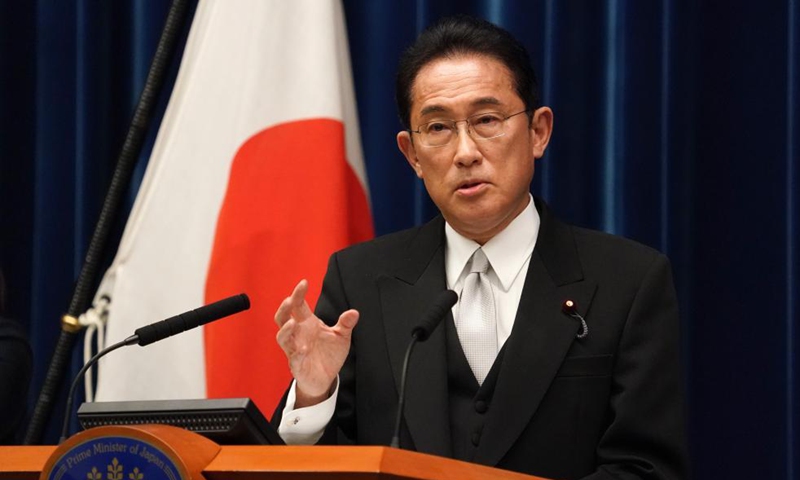
Japan's new Prime Minister Fumio Kishida speaks during a press conference at prime minister's official residence in Tokyo, Japan, on Oct. 4, 2021. (Toru Hanai/Pool via Xinhua)
Japanese Prime Minister Fumio Kishida said on Monday he would make full use of his surprisingly strong election win as he tackles major policy decisions, including trying to pass an extra budget to accelerate the recovery from the pandemic.
Stocks surged to a one-month high on relief the Liberal Democratic Party (LDP) on Sunday held onto its single-party majority in defiance of predictions - although it did lose a handful of seats, including that of party secretary-general Akira Amari.
The results are likely to embolden Kishida, only in power a month and with little yet to show in terms of policy successes, allowing him to put his stamp on the office ahead of an upper house election in 2022.
"We won a majority, which I think in this election was significant," he told reporters. "I want to make full use of this both in running the government and running parliament."
Kishida, a soft-spoken former banker, has hewed to traditional policies of the party's right wing, pushing to increase military spending.
But gains made by the LDP's dovish junior coalition partner Komeito, which increased its seats from 29 to 32, may serve to reign in some of the party's more hawkish tendencies in this area, analysts said.
Otherwise, Kishida is likely to maintain the diplomatic policies of his predecessors, strengthening ties with key ally the US and like-minded Asian-Pacific nations such as India and Australia through the Quad security framework.
Domestically, he has promised to address wealth inequality, touting a "new capitalism" as the world's third-largest economy struggles to rebound from the coronavirus pandemic.
Japanese shares jumped on Monday, with the Nikkei index rising more than 2 percent to a one-month high on hopes for a stable government and more government spending.
While initial exit polls on Sunday suggested the LDP would have to rely on its junior coalition partner, Komeito, to keep a majority, the conservative party instead won a solid majority on its own.
In the end, the LDP claimed 261 seats against the 276 it held before the election - an absolute stable majority that will give it control of parliamentary committees and ease passage of legislation, including key budget proposals.
A poorer showing would have heightened expectations that Kishida could follow predecessor Yoshihide Suga in becoming another short-term premier in the wake of Shinzo Abe, Japan's longest-serving premier, who stepped down in 2020 due to ill health.
The party did take some notable hits in his single-seat district, and a former economy minister and the leader of one of the party's factions, Nobuteru Ishihara, who lost to an opposition candidate in a western Tokyo district.
Reuters




